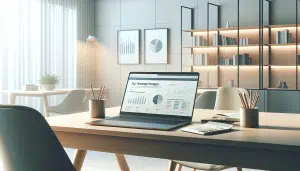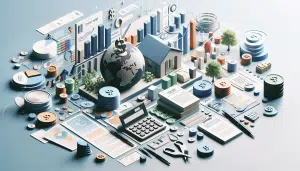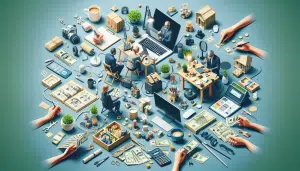Simple Practices That Can Help You Stay Organized and Efficient
Isabella Lewis August 6, 2025
In today’s busy world, staying organized and efficient is essential for success, whether in your personal life, work, or both. However, maintaining organization and efficiency often feels overwhelming, especially when juggling multiple tasks, projects, and deadlines. The good news is that staying organized doesn’t have to require drastic changes or complex systems. By implementing simple, practical habits into your routine, you can improve your organizational skills and boost your efficiency without the stress. In this article, we explore simple practices that can help you stay organized and increase your productivity.

The Importance of Organization and Efficiency
Being organized is not just about keeping things tidy; it’s about creating an environment that allows you to focus on what truly matters. Organization helps clear mental clutter, reduces distractions, and enhances your ability to make better decisions. Meanwhile, efficiency refers to completing tasks with minimal wasted time or effort, which is crucial for maintaining productivity over time.
- Clearer Focus: A well-organized workspace and schedule allow you to concentrate on important tasks and minimize distractions.
- Time Management: Being efficient with your time helps you get more done in less time, leaving room for personal growth and relaxation.
For more on the importance of organization and efficiency, see Psychology Today’s article on Time Management and Organization.
Simple Practices for Staying Organized
Staying organized doesn’t have to be complicated. Here are some simple practices that can help you maintain organization in both your physical space and mental approach:
1. Declutter Regularly
One of the most effective ways to stay organized is by regularly decluttering your physical space. Clutter can lead to a chaotic environment, which makes it difficult to focus and stay efficient. Set aside a few minutes each day to tidy up your workspace or living area.
- The Two-Minute Rule: If a task takes less than two minutes, do it right away. This rule applies to small organizing tasks such as putting away papers, wiping down surfaces, or returning items to their proper place.
- Weekly Declutter Sessions: At least once a week, take time to do a more thorough declutter. This will help maintain a clean and organized space without feeling overwhelmed.
For more on decluttering, check out Forbes’ article on the Power of Decluttering.
2. Use a Simple Task Management System
Task management is key to staying organized. Instead of relying on your memory to keep track of everything, use a simple task management system. Whether you prefer digital tools or pen and paper, having a system in place helps you stay focused on your priorities.
- To-Do Lists: Create daily to-do lists that outline your tasks for the day. Break down larger tasks into smaller, actionable steps to keep things manageable.
- Task Prioritization: Use methods like the Eisenhower Matrix (urgent vs. important) or the ABC method (prioritize A tasks) to help you decide what needs attention first.
For more on creating effective to-do lists, see MindTools’ guide on Task Management.
3. Schedule Your Time Effectively
Time management is one of the most important aspects of being organized and efficient. Scheduling your time ensures that you dedicate enough time to important tasks and avoid overcommitting yourself.
- Time Blocking: Allocate specific blocks of time for focused work, meetings, and personal activities. For example, set aside time in the morning for deep work and time in the afternoon for meetings or collaborative tasks.
- Plan the Night Before: Before going to bed, review your schedule for the next day. This helps you mentally prepare for the tasks ahead and get an early start.
For more on time blocking, see Psychology Today’s article on Time Management for Better Efficiency.
4. Keep Digital Files Organized
In today’s digital world, staying organized means managing both physical and digital clutter. By maintaining an organized digital workspace, you can easily find files, emails, and documents, which saves time and reduces stress.
- Folder Systems: Use clear folder structures for your digital files. Organize them by project, client, or topic, and keep the hierarchy simple to avoid confusion.
- Regular File Clean-Up: Set a schedule for deleting unnecessary files or archiving old documents. Regularly clear out your inbox to prevent emails from piling up.
For more on organizing digital files, see Lifehack’s guide on Digital Organization.
5. Automate Routine Tasks
One way to improve efficiency and stay organized is by automating routine tasks. Automating repetitive tasks allows you to free up time for more important activities. There are many tools available that can automate everything from scheduling to email management.
- Set Up Reminders: Use digital tools such as calendars or reminder apps to schedule recurring tasks, such as bill payments, meetings, or follow-ups.
- Automate Email Responses: Set up automatic responses for common inquiries or use email filters to sort incoming messages into categories.
For more on automating tasks for efficiency, check out The Muse’s article on Productivity Apps.
Simple Practices for Staying Efficient
Efficiency is all about maximizing your output without sacrificing quality or well-being. Here’s how you can improve your efficiency:
1. Focus on One Task at a Time
Multitasking may seem like a way to get more done, but it actually reduces productivity and increases errors. Instead, focus on one task at a time, giving it your full attention.
- Single-Tasking: Prioritize tasks by importance and work on them sequentially. By focusing on one thing at a time, you’ll be able to complete it faster and more effectively.
- Pomodoro Technique: Use the Pomodoro Technique, which involves working for 25-minute intervals followed by a 5-minute break. This helps maintain concentration and prevents burnout.
For more on the Pomodoro Technique, see MindTools’ guide on Time Management.
2. Limit Distractions
Distractions are a major hindrance to efficiency. By minimizing interruptions, you can stay focused on your tasks and complete them more efficiently.
- Control Your Environment: Turn off notifications, close unnecessary tabs, and create a workspace that is free from distractions. Use apps like Focus@Will or Freedom to block distracting websites during work hours.
- Set Boundaries: Let family members or colleagues know when you need uninterrupted time to focus. This helps prevent interruptions and increases your efficiency.
For more on managing distractions, read Psychology Today’s article on Minimizing Distractions.
3. Set Clear Goals and Priorities
To be efficient, you need a clear understanding of what you want to achieve and how to prioritize tasks. Setting specific, measurable goals helps you stay focused and motivated.
- SMART Goals: Use the SMART framework (Specific, Measurable, Achievable, Relevant, and Time-bound) to set goals that are both realistic and motivating.
- Daily and Weekly Priorities: At the beginning of each day or week, identify your top priorities and tackle the most important tasks first.
For more on setting clear goals, see Forbes’ article on Goal Setting and Efficiency.
Conclusion: Staying Organized and Efficient for Success
Staying organized and efficient doesn’t require complex systems or drastic changes. By implementing simple practices, such as decluttering, managing your time effectively, and focusing on one task at a time, you can significantly improve your productivity and create more space for growth and success. Whether in your personal life or career, organization and efficiency are key to achieving long-term goals without burning out. Incorporate these simple habits into your daily routine, and you’ll be well on your way to greater success and fulfillment.
References:
- Psychology Today. (2021). The Importance of Time Management and Organizational Skills. Retrieved from https://www.psychologytoday.com/us/articles/2021/02/the-importance-of-time-management-and-organizational-skills
- Forbes. (2020). The Power of Decluttering and Its Impact on Productivity. Retrieved from https://www.forbes.com/sites/forbeshumanresourcescouncil/2020/03/10/how-decluttering-can-improve-your-productivity/
- MindTools. (2021). Time Management and Task Management for Better Efficiency. Retrieved from https://www.mindtools.com/pages/article/newHTE_02.htm
- The Muse. (2021). Best Productivity Apps to Stay Organized. Retrieved from https://www.themuse.com/advice/the-best-productivity-apps-to-help-you-stay-organized







